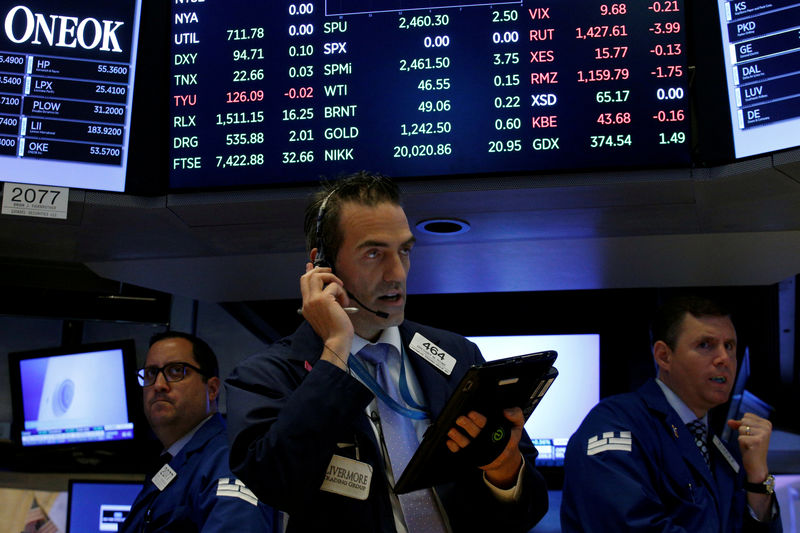By Chuck Mikolajczak
NEW YORK (Reuters) - A gauge of world stocks edged lower on Wednesday even as Wall Street's venerable Dow Jones Industrial Average topped the 22,000 barrier on strength in Apple (O:AAPL) shares, while the U.S. dollar held near 15-month lows on doubts about another rate hike this year.
Shares of Apple, the largest U.S. company by market capitalisation, were up 4.73 percent at $157.14 after hitting a record high of $159.75 in the wake of its earnings, helping lift the Dow above the 22,000 mark.
Apple reported better-than-expected iPhone sales, revenue and earnings-per-share, and signalled its upcoming 10th-anniversary phone is on schedule.
Apple's gains were just enough to help keep the broader U.S. stock indexes out of negative territory, as the benchmark S&P 500 eked out a slight gain and the Nasdaq ended flat.
"Obviously it's a big fat number, typically at those big round numbers the market seems to hesitate," said Mark Luschini, chief investment strategist at Janney Montgomery Scott in Philadelphia.
"I'm looking at this as a situation where the underlying evidence as to why the stock market has responded as well as it has so far this year is the fertile climate for corporate profits, which is likely to remain so."
The Dow Jones Industrial Average (DJI) rose 52.32 points, or 0.24 percent, to 22,016.24, the S&P 500 (SPX) gained 1.22 points, or 0.05 percent, to 2,477.57 and the Nasdaq Composite (IXIC) dropped 0.29 points to 6,362.65.
The pan-European FTSEurofirst 300 index (FTEU3) lost 0.41 percent and MSCI's gauge of stocks across the globe (MIWD00000PUS) shed 0.02 percent.
European shares were weighed down by declines in banking (SX7P) and mining (SXPP) shares.
The U.S. dollar hit its lowest level against the euro in more than 2-1/2 years on uncertainty over the path of interest rate hikes for the Federal Reserve this year and expectations for European Central Bank hawkishness.
Tepid U.S. inflation and political turmoil in Washington have lessened the possibility of another Federal Reserve rate hike this year.
Improving data in other major economies has also served to push the greenback down nearly 11 percent from January highs, benefiting commodities and emerging markets.
The dollar index (DXY) fell 0.17 percent, after touching 92.548, the lowest since early May 2016. The euro <EUR=> was up 0.45 percent to $1.1854.
Investors also dealt with conflicting statements from Federal Reserve officials.
St. Louis Federal Reserve James Bullard is opposed to further U.S. interest rate increases by the central bank, Market News International reported, and warned that more hikes could hinder domestic inflation.
Cleveland Fed President Loretta Mester, however, said the Fed should remain focussed on gradually tightening U.S. policy because one-off factors, not a long-lasting trend, have caused inflation to weaken in recent months.
U.S. private employers added 178,000 jobs in July, below economists' expectations, a report by a payrolls processor showed on Wednesday, ahead of the U.S. Labor Department's more comprehensive non-farm payrolls report on Friday.
U.S. profits for the second quarter have been strong, with earnings growth currently at 11.4 percent, according to Thomson Reuters data. Of the 350 companies in the S&P 500 that have reported through Wednesday morning, 70 percent have topped expectations.
Benchmark 10-year notes (US10YT=RR) last fell 4/32 in price to yield 2.2656 percent, from 2.251 percent late on Tuesday.

U.S. crude